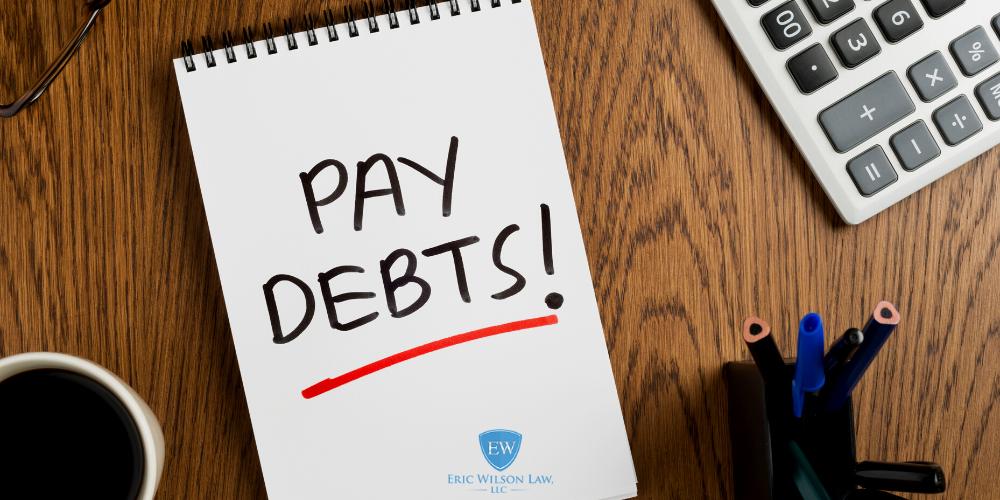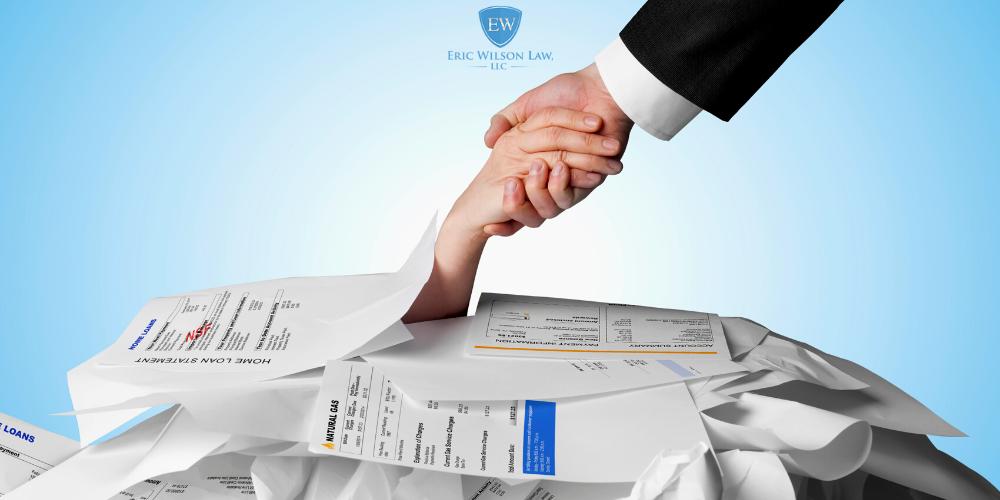If you get too far behind on your bills, you will probably start getting calls, emails, letters, or even texts from your debt collector. But can debt collectors come to your house if you get too far behind on your bills? Federal and state law says yes, debt collectors can legally show up to your house, but they must follow specific rules if they choose to do so. This situation is uncommon, but it does happen. Below, Eric Wilson explains the specifics of how debt collectors are supposed to act if they do show up at your house, and whether or not you can sue them for abusive debt collection practices.
Eric Wilson is an experienced bankruptcy and consumer protection lawyer in Tuscaloosa, Alabama. He is passionate about helping his clients live happy lives, free from crushing debt and financial distress. For more information on how Eric Wilson can possibly help you, call 205-349-1280 today.
What is the Fair Debt Collection Practices Act?
The Fair Debt Collection Practices Act (FDCPA) is a federal law that was passed in 1977. It forbids debt collectors and debt collection agencies from engaging in abusive debt collection practices. It’s important to note that the FDCPA doesn’t apply to creditors.
If a debt collector or debt collection agency violates a debtor’s rights while attempting to collect consumer debt, they can definitely face legal action.
Can Debt Collectors Come to Your House?
So – can a debt collector come to your house? The answer is yes, but they have to follow the rules laid out in the Fair Debt Collection Practices Act. They cannot use profane language or threats, and they can’t knock on the door during “unreasonable hours,” which are before 8 a.m. or after 9 p.m.
Still, many consumers would feel violated or threatened if a debt collector showed up at the door during a reasonable hour in order to collect the money they owe. So if a consumer tells the debt collector that they can no longer come onto their property, then the debt collector must obey and use another method to collect payments.
It’s important to realize that most debt collectors don’t show up to their debtor’s houses asking for money, although it has definitely happened before. Using phone calls, letters, or emails to collect debt is far easier, cheaper, and less time-consuming than sending someone to collect debts in person.

Where, When, and How Debt Collectors Can Contact You
The Fair Debt Collection Practices Act lays out specific rules for how debt collectors are allowed to contact their debtors.
A debt collector can contact a debtor between the hours of 8 a.m. and 9 p.m. on any given day. They can use multiple means of communication, such as phone calls, emails, texts, letters, or in-person visits. Debtors often receive calls at work, which is perfectly legal, unless they specifically tell the debt collector to not call them at work anymore. If a debtor grants permission for a debt collector to call them outside of those hours, then they can legally do so. If a debtor is actively working with an attorney, then the debt collector must contact the attorney.
Debt collectors also have the legal right to contact the spouse, family members, or neighbors of the debtor as long as they do so to request the debtor’s contact information. They cannot divulge any information about the person’s debt, and they cannot call their loved one’s more than once.
Where, When, and How Debt Collectors Can’t Contact You
Debt collectors cannot contact debtors outside the hours of 8 a.m. to 9 p.m. unless they have permission to do so. They also cannot resort to threatening violence or using profane language in order to get the person to pay off their debts. And, although it is uncommon, debt collectors cannot resort to actual physical violence.
Can Debt Collectors Show Up To Your House and Take Your Property?
If you owe unsecured debt, like credit card debt or student loan debt, you should not worry about a debt collector showing up to your house and taking your property. Unsecured debt is not backed by collateral, so if a debt collector happened to show up at your house, they would have no right or reason to take anything from you. Debt collectors are much more likely to charge late fees or file a judgment against you if you have unpaid unsecured debt.
Now, if you owe secured debt that’s backed by collateral, this can be a different story. One of the most common types of secured loans are car loans. If you owe money on a car loan, a lender can definitely show up to your house and take your car without your permission. This is called car repossession. Even in this situation though, the lender must follow specific rules. They cannot harass, annoy, or alarm you with threats or profane language during the car repossession. They also can’t break into your garage or even destroy your garage to repossess the car. But if the car is just sitting in your driveway, they can legally take it.
Failing to pay your mortgage loan is a similar story. A debt collector can’t just knock on your door, kick you out, and take your home. But if you fail to pay your bills, they can begin the foreclosure process in order to eventually take away your property. The foreclosure process can be quite long, so you will have plenty of time to seek legal and financial help before you’re evicted.
What To Do if a Debt Collector Is Coming To Your House When You Don’t Want Them To
While it is a fairly rare occurrence, debt collectors can show up at your house. But what should you do if they come to your house and you don’t want them to?
- Don’t Answer the Door: Just because a debt collector can come to your house, doesn’t mean you have to answer the door and speak to them. They could be a legitimate debt collector, or they could be some kind of scammer. Either way, if you don’t want to deal with them in-person, then you don’t have to.
- Don’t Offer Any Information or Money: If you do answer the door, don’t give them any information about your debts or your financial situation. Don’t hand them cash or a check, no matter what they say. Again, you don’t know for sure who you’re dealing with – this person could very well be a scammer. Plus, it’s better to deal with debt through written documentation so that you have evidence of everything that’s being said and done.
- Tell Them They Cannot Step Foot on Your Property Again: If you don’t feel safe doing this in person, do it via email or letter. The Consumer Financial Protection Bureau provides sample letters for people who don’t want debt collectors to contact them a certain way in the future.
- If They Show Up Again, Call The Police and an Attorney: If a debt collector shows up to your house again asking for payment, you have grounds to call the police and/or take legal action.

Can You Sue if a Debt Collector Comes To Your House Even After You Have Told Them To Stop?
Yes, you can definitely sue for a debt collector knocking on your door more than once, especially after you have told them to stop. This is a direct violation of the Fair Debt Collection Practices Act, and you can recover financial damages.
Not only is Eric Wilson a bankruptcy lawyer, but he is also a consumer rights and protection lawyer. If you’re enduring abusive debt collection practices, Eric Wilson can protect your legal rights and even stand by your side in court if need be.
Damages for Abusive Debt Collection Practices
If you’ve endured abusive debt collection practices, Eric Wilson can help you recover financial compensation for the following types of damages:
- Emotional distress
- Physical distress (if a debt collector becomes physically violent)
- Lost wages (if your debt collector’s harassment via phone at work caused you to miss work or get fired)
- Wage garnishment recovery (if a debt collector took money out of your paycheck or bank account to repay your debts)
- Statutory damages of up to $1,000 per FDCPA violation
- Attorney fees and court costs

Call a Tuscaloosa Bankruptcy Lawyer at Eric Wilson Law Today
If you have become a victim of debt collector harassment, you have grounds to take legal action under federal and state laws. No matter how bad a person’s debt situation is, it’s never okay for debt collectors to resort to threats, profane language, physical violence, or violating your privacy at your home. Eric Wilson can protect your legal rights and help you obtain justice.
If you’re feeling crushed under the weight of your debt and as a result you’re experiencing car repossession, home foreclosure, wage garnishment, and/or judgments, it’s crucial that you reach out to a professional for help. Eric Wilson has been helping his clients achieve happy, debt-free lives for more than 25 years. He can help you too. Call 205-349-1280 to schedule a free consultation today.


